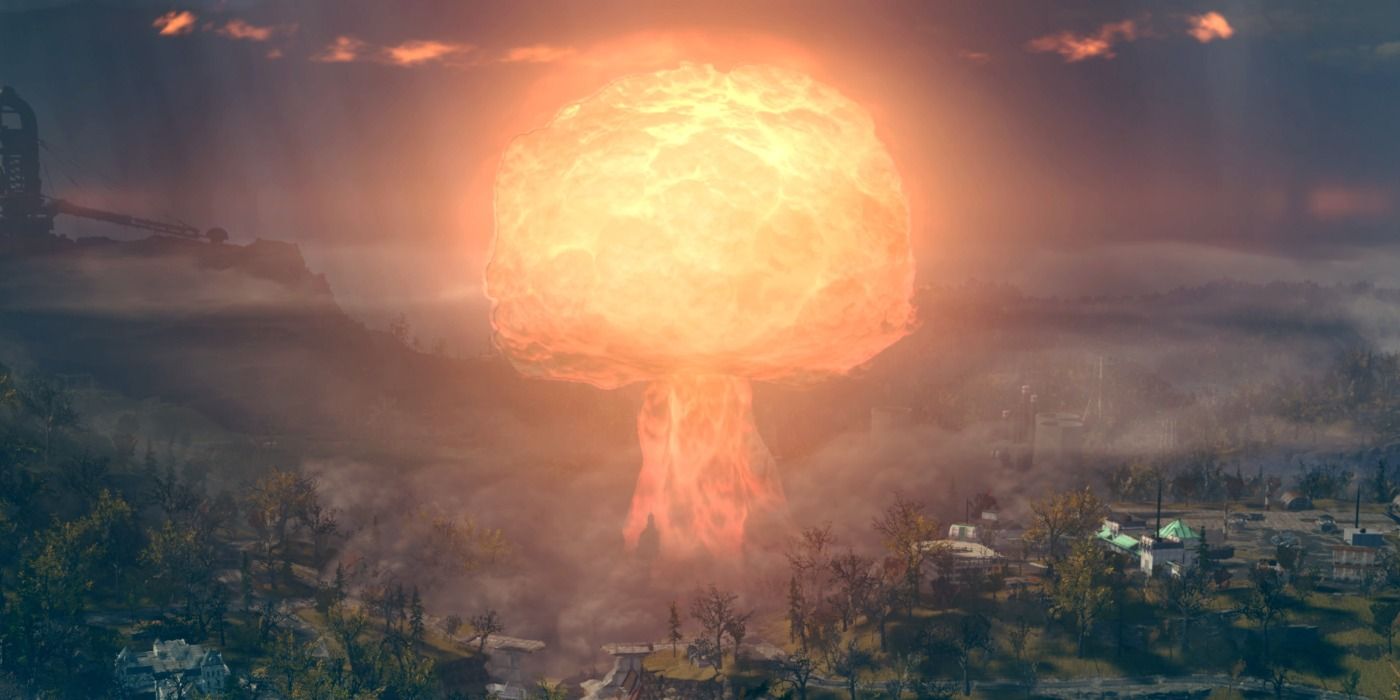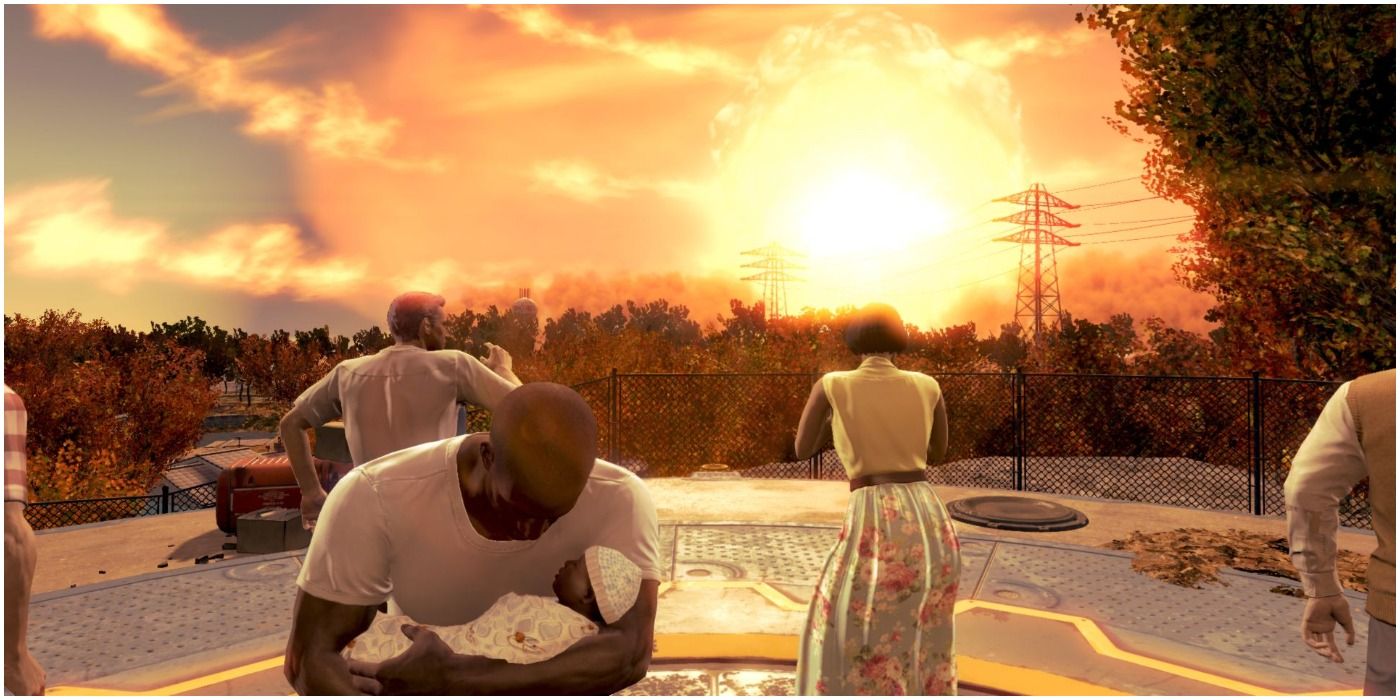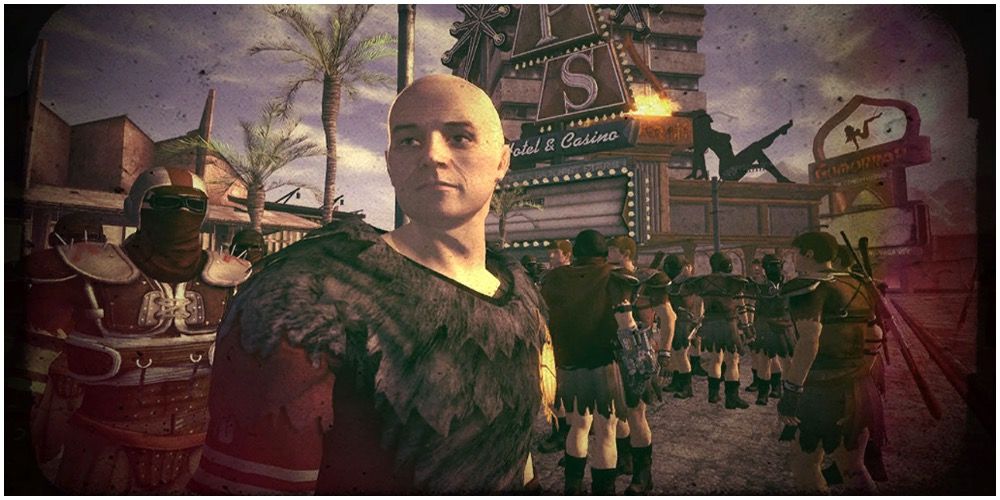The Fallout games have always taken place in the aftermath of the Great War, a nuclear conflict which lasted just two hours before all participating nations had been destroyed in the ensuing atomic apocalypse. However, Fallout 5 needs to make a change from recent Fallout games.
The last two Fallout games, Fallout 4 and Fallout 76, have put the Great War itself at the forefront of events rather than it remaining a piece of ancient history. In Fallout 4, the player witnesses the detonation of a nuclear weapon over Boston, while Fallout 76 takes place just 25 years after the war itself. There are some good reasons, however, that Fallout 5 should leave the Great War far behind.
The Great War
The Great War is the main inciting event of the Fallout franchise, but that doesn’t mean it should be increasingly centered as an event in the games themselves. Nuclear war may be the event that transforms the world of Fallout into the wasteland players fell in love with, but by centering on the war itself more and more, the Fallout franchise misses out on some of its most interesting opportunities.
While the Great War sets off the events of Fallout, it is not what makes the Fallout setting unique. That's its exploration of pre-war 1950s aesthetics and their appropriation by some of the societies and factions which spring up years after the war. The Kings in Fallout: New Vegas, for example, all style themselves after Elvis Presley, but are far enough removed from the singer’s actual life that none of them even know his name.
These kinds of factions from the Boomers to the Brotherhood of Steel work because they show how the remnants of pre-war society have changed and adapted to the post-war wasteland, and the kinds of ideas they hang onto. This is the source of some of the best commentary the Fallout games have to offer. Returning to the example of the Kings, the fact that Elvis’ actual name and life story are long lost details comments on the sort of mythical status he took on while alive and his legacy after his death. It also hints that the appeal of Elvis had nothing to do with a real person, but the allure of raising oneself to a symbolic level in American culture.
The player is also made to understand that there are aspects of the Elvis myth which were advantageous to appropriate in a setting like New Vegas. Fallout: New Vegas uses the fact that Elvis’ own experiences are lost to history to show how irrelevant his individuality was to his myth to begin with when compared to his brand and aesthetic, highlighting the irony that part of Elvis' mythos was one of individual rebellious freedom that went to become a new kind of conformity.
This kind of commentary can only flourish when the Fallout games take place long enough after the Great War that players aren’t just seeing the aftermath, but the adaptations people have made to survive over the subsequent centuries. The more the Fallout setting distances itself from the Great War, the more distinct its factions and their commentary on contemporary American culture are able to become.
Though the Fallout games have a memorable visual style and a clear set of retrofuturist influences, the franchise risks that aesthetic losing its original value by setting games nearer to the Great War. Fallout’s pastiche of 1950s American advertising culture and the idealized world it portrays remains ironic when the games are set in the immediate aftermath of the destruction of the Great War brought about by that same culture, but without sufficient distance from the inciting event, the games are less able to draw out the full implications of their themes.
Another good example of this in Fallout: New Vegas is the presence of Caesar’s Legion, a group of raiders who have organized under a brutal tyrant emulating the Roman Empire. This sort of adaptation only makes sense long after the war. The hegemonic pre-war culture is already long gone, and people like those in Caesar’s Legion turn instead to different cultural aesthetics as guiding lights. The fact that the members of Caesar’s Legion turn to a society celebrated for its cultural achievements but also known for its Imperialism and brutality draws an ironic parallel with their rivals, the New California Republic, who like the Legionaries are attempting to emulate a pre-war culture and system of government that ultimately destroyed itself.
Post-War Culture in Fallout 5
By using the time difference and the development of post-war cultures like Caesar’s Legion, Fallout: New Vegas is able to hone its commentary on the world to a finer degree. By setting Fallout 76 so close to the events of the Great War Fallout 76 misses the opportunity to explore the ways humans have changed in any other way than literal Fallout mutations. The vast majority of Fallout 4 may be set centuries after the Great War, but the game did not take full advantage of the changes that could have taken place during that time.
Instead of showing major American cities like Fallout 4's Boston as if they’ve only recently been destroyed, Fallout 5 should explore the ways humans have adapted and repurposed aspects of pre-war culture. This has always been a theme of the Fallout games, but one that has been less focused on since New Vegas.
In Fallout 4’s Commonwealth, for example, players can find locations like the Drumlin Diner which look as if they have only just been bombed, with nobody even patching up the windows despite the diner being operational centuries after the Great War. Changes to the Drumlin Diner may not have been as on-the-nose as the Kings in New Vegas, but new combinations of different architectural styles is just one way Fallout 4 could have explored the ways human society meaningfully adapted to post-war life.
As such, it isn’t just important that Fallout 5 take place significantly after the Great War, but that Bethesda – or possibly Obsidian Entertainment if the studio gets the opportunity to make Fallout: New Vegas 2 – should take the time difference as an opportunity to fully explore the post-war world as more than just an echo of its former glory, but its own distinct being. Fallout 5 should use its setting to explore the new cultures which have pre-war origins, but like the Kings may not even be aware of exactly what those origins were.
Fallout 5 has not been announced.



